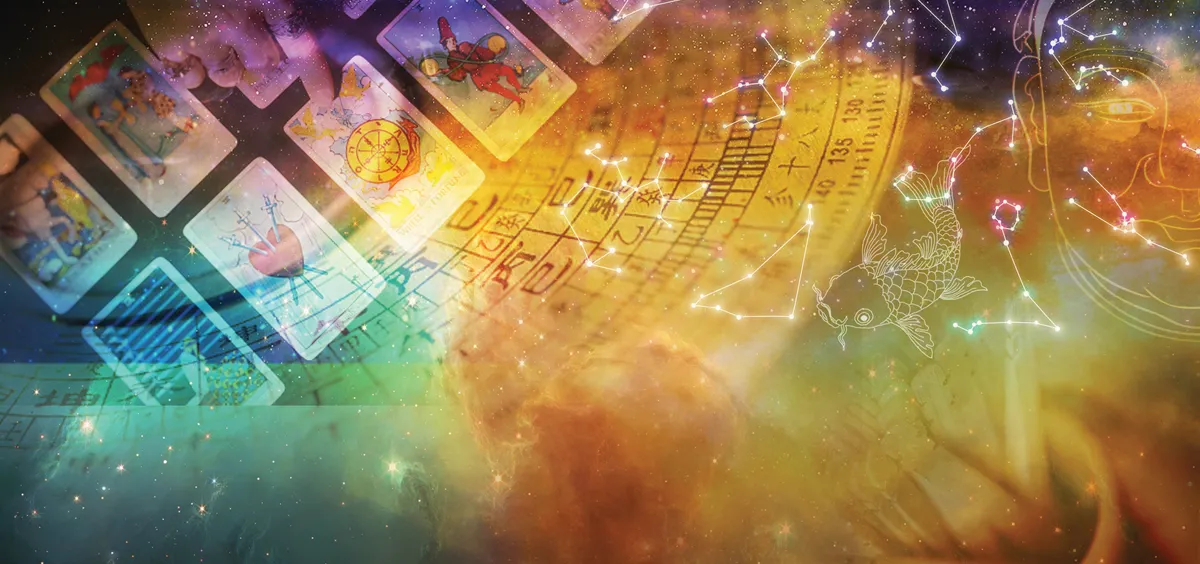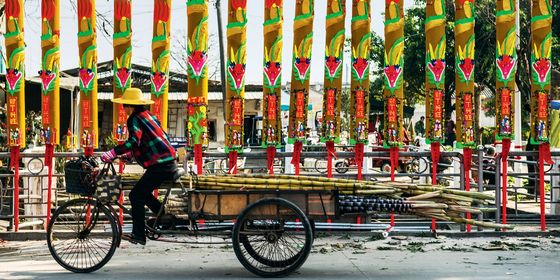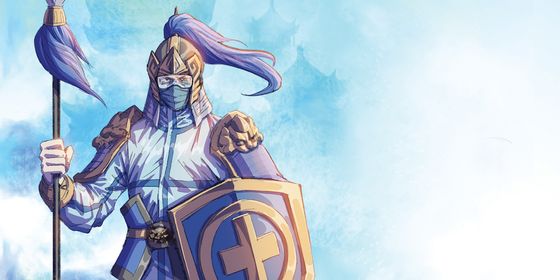The long-suppressed practice of divination revives, with modern twists
“Lüdagunr!” cries the old woman selling “donkey rolls,” a snack made of glutinous rice with bean paste, in front of a courtyard home on central Beijing’s Chengxian Street. “Want some lüdagunr?”
Get closer, though, and she might lower her voice to mutter: “Want your fortune told? Try inside.” This is because Chengxian Street is also known as “Fortune Telling Street,” in reference to an ancient though enduring profession that’s tolerated—along with other “feudal” beliefs, such as feng shui—yet still occupies a legal gray zone in China even after thousands of years of practice.
Today, fortune telling—also known as divination or “fate calculation” (suanming, 算命)—is arguably more prevalent than it’s ever been, and more diverse. Millennials are turning to swanky tarot-reading parlors and apps that claim to offer “AI fortune telling”; government officials have been routinely chastised for their predictive predilections; and these trends have inevitably attracted the attention of scammers.
In September 2019, police in Anhui province detained 100 members of a criminal gang said to have cheated up to millions of customers out of a total of 50 million RMB (7 million USD) by posing as fortune tellers on Weibo and WeChat; one woman, conned out of 33,000 RMB in supposed offerings to the gods, only grew suspicious after a fortune teller said she would live for 400 years.
In August the same year, authorities in the southwestern Chongqing municipality arrested 210 people accused of running a 24 million RMB (3.41 million USD) online fraud that convinced users they had “bad luck” and needed to purchase expensive amulets blessed by “fortune telling masters.”
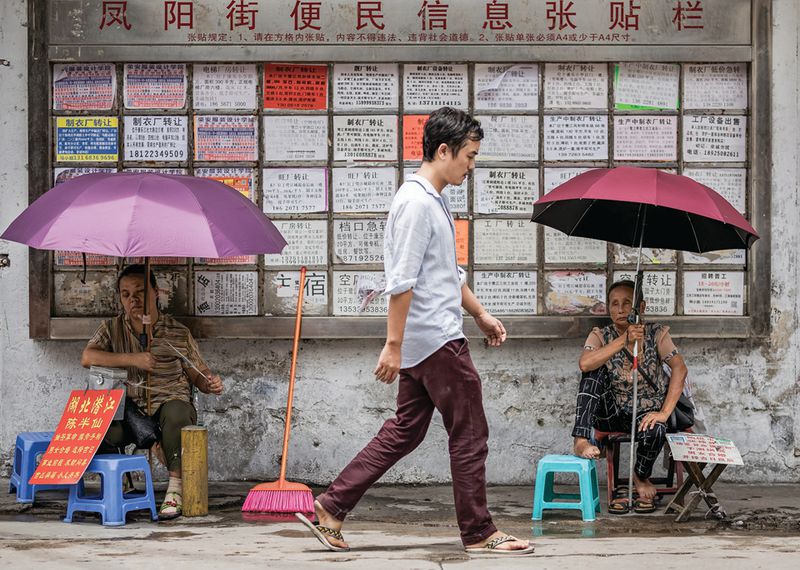
Two blind fortune tellers wait for customers on a street in Guangzhou
Around Beijing’s Chengxian Street, across from the Yonghegong Lama Temple, there are usually dozens of signs promising “blessings granted” or offers to “change your fate.” Their methods vary—there are many types of divination, including reading omens and patterns, palmistry and geomancy, and entering “spirit trances”—but most usually involve reference to the Eight Birth Characters, the Five Elements, Eight Trigrams, and the Yijing or Book of Changes, an ancient philosophic text that generations of diviners have used as a bible.
Some shops are occupied by monks who claim to have arcane knowledge acquired on some sacred mountain. Some discreetly offer bespoke ceremonies for fees that can run to tens of thousands of renminbi.
But most operate more like the lüdagunr seller: legitimate shopkeepers who, for a cut of the revenue, share premises with plain-clothed fortune tellers who ply their trade discreetly inside (this particular woman offered to drop her price from 200 to 100 RMB for TWOC, for which she would get a commission of 50 RMB).
These compromises aside, the suanming needs of modern Chinese are not much different from those centuries ago. “Most poor people get their fortunes told because they’re poor, they’re facing some difficulty, some obstacle they can’t overcome,” a self-taught fortune teller told the Chinese magazine One-Way Street in 2018.
The modern practice also benefits from millennia of well-developed, convincing doctrine. “[It] is not all superstition…it is logical, and quantitative, and systematic, ranging from major things like the workings of the cosmos to the building of individual homes,” the fortune teller said.
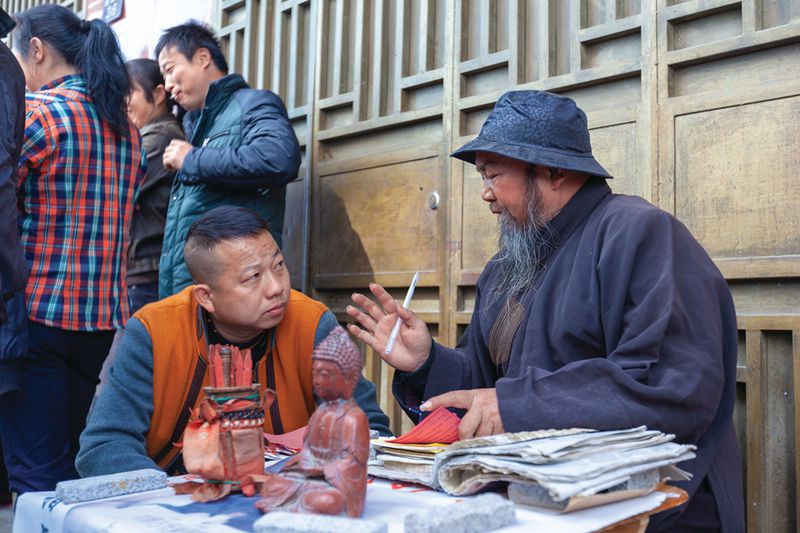
Many fortune tellers offer a grab bag of different divination methods
Anthropologist Geng Li, author of Fate Calculation Experts: Diviners Seeking Legitimation in Contemporary China, agrees. “The text-based knowledge of fortune telling is highly rationalized and can be learned through training rather than spiritual insight,” she tells TWOC. “The symbolic calculating and reasoning techniques rationalize much practice of fortune telling in China and elevate it from ‘magic.’”
While its modern popularity transcends class, divination has been entwined with upper-crust Chinese politics and society for about 3,000 years, since the Zhou dynasty (1046 – 256 BCE) replaced the failing Shang dynasty (1600 – 1046 BCE), and established the “Mandate of Heaven.”
Under this doctrine, a ruling dynasty’s authority was granted by deities above, who expressed their will through mundane events—military victories, astronomical phenomena, or natural disasters—that were interpreted by the court’s diviners for deeper meanings.
The practice of divination filtered down through society. During the Song dynasty (960 – 1279), Prime Minister Wang Anshi commented that, in the capital city alone, “at least 10,000 diviners lived.” By the time of the Ming dynasty (1368 – 1644), local officials were consulting geomancers with urban planning; wealthy merchants checked in with Daoist priests before making important decisions; expectant parents paid esteemed astrologers to draw up birth charts for their newborn; while itinerant “witches” and “sorcerers” preyed on peasants seeking solutions to their daily woes.
Occasionally, these beliefs threatened to destabilize the dynasty: After a series of floods and droughts in 1600, the rebel leader Zhou Guyuan prophesied a political changeover and launched an anti-eunuch revolt. Yet, from the Song period onward, most intellectuals held a tolerant outlook toward divination—merely debating its Confucian morality, rather than calling for its practitioners’ heads (especially as poorer scholars often had to turn to fortune telling themselves to make a living).
In 1928, though, the Nationalist government made broad legislations banning superstitious occupations such as astrology, palm reading, and fortune telling. Despite widespread propaganda and crackdowns, there was considerable pushback: Yuan Shushan, a well-known diviner, argued that the profession was part of China’s heritage and encouraged moral behavior.
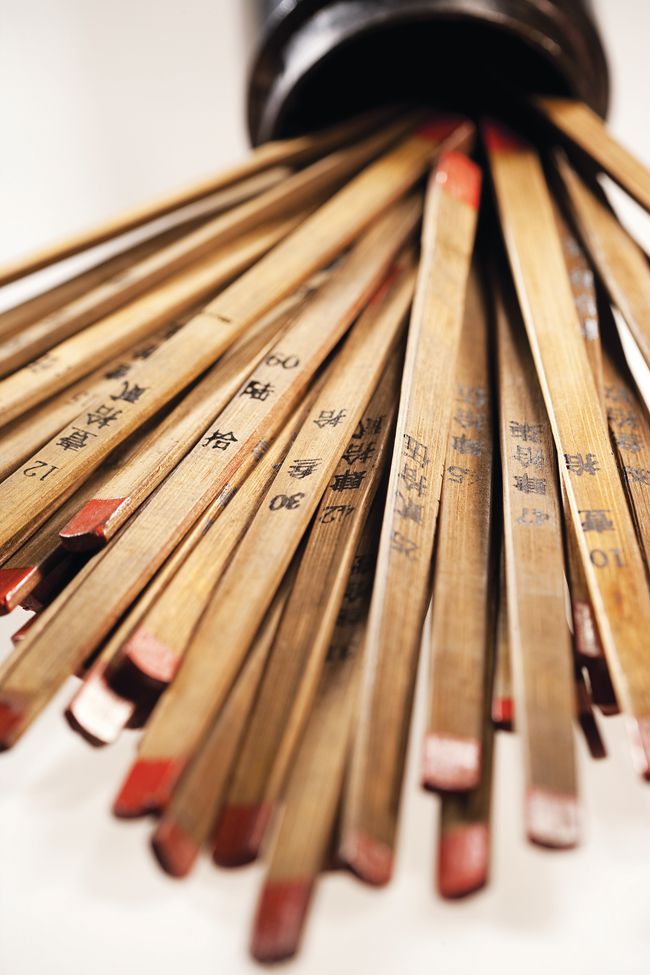
Drawing lots is a folk fortune telling method offered at many temples
These arguments, and the enduring popularity of superstition, ensured that the Communist Party initially took a soft approach toward fortune tellers, which helped them win political support in the rural heartlands.
However, during the first three decades of Communist rule after 1949, many folk practices were reclassified as “feudal superstitions” (fengjian mixin) or, in the case of shamanism and fortune telling, outright “sorcery” (wushu). Practitioners were publicly mocked and denounced alongside gamblers, prostitutes and drug addicts as erliuzi, anti-revolutionary elements who corrupted society and spread false rumors.
In the PRC’s first Criminal Law, codified in 1979, fengjian mixin were penalized under the vague terms of “frauds and fabricating rumors.” The law was revised in 1997 to criminalize only instances of outright deception, such as in the recent cases of the million-yuan scams.
Since the 1980s, many previously suppressed beliefs, such as Confucianism and ancestor worship, have come to be actively encouraged as “good” customs that could contribute to the country’s economic growth and foster cultural pride.
According to a 2015 report published by the Chinese Academy of Social Sciences, officials in some villages and towns now encourage residents to visit temples and seek their suanming services—and often take part themselves—as forms of “folk beliefs” (民间信仰), a loosely defined faith system with its own office under the National Bureau of Religious Affairs since 2007.
Officials in other places, though, continue to treat suanming as superstition and to shut down fortune-telling businesses. Beijing’s Fortune Telling Street has endured numerous crackdowns in recent years. In 2014, censors banned the publication of almanacs used by readers seeking their fortune for the year ahead.
Even as debate over divination continued in the last three decades, its popularity seemed only to grow. According to a 2003 study by the party-affiliated China Association for Science and Technology (CAST), 300 million people in China believed in fortune telling. A 2007 study by China’s Horizon Research Consultancy Group found that 102 million Chinese people sought services in fortune telling, and 315 million engaged in “amuletic practices.”
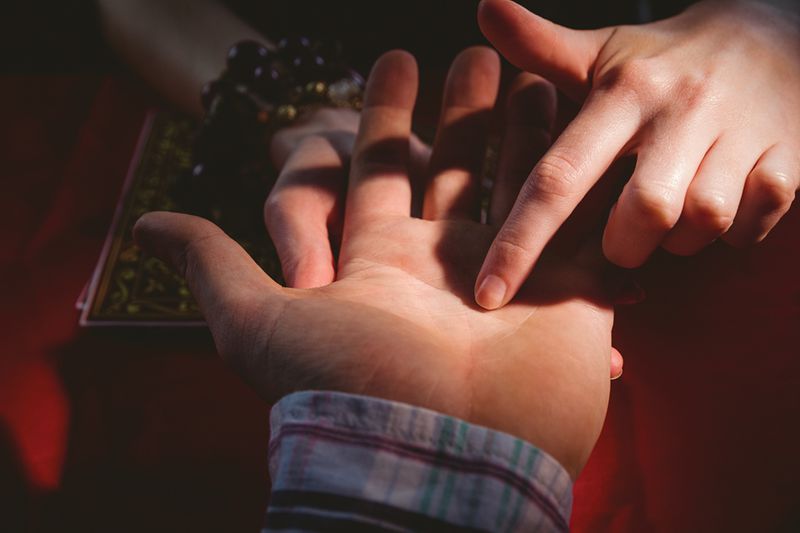
Chinese palmistry has a doctrine distinct from Western varieties
New believers are seeking fresh twists on the ancient art, including tarot, a European form of cartomancy that has lately become popular with younger Chinese.
The well-educated “post 90s” generation appears to have become a major market for fortune telling, as its members grapple with increasing pressure in their careers, marriage, or finances: A recent report by new media outlet Yitiao found over 60,000 posts and 400 groups related to suanming, “divination” (占卜), and “fate” (命中) on popular millennial social media app Douban, with the biggest group claiming around 38,000 members.
According to Li, today’s suanming customers come from various social groups. “Businessmen are particularly superstitious, because of the very high stakes and the tremendous amount of uncertainties in the market,” she says.
A post-90s singer told Yitiao that fortune seeking is also common within entertainment circles, and he used to be addicted to it himself. “I’d go to see any fortune teller I heard of, whether they’re accurate or not…always with the same questions, ‘Will I get famous? When will I get famous? How will I get famous?’”
“Western forms of fortune telling, such as astrology and tarot, involve individual spiritual issues more frequently than do Chinese indigenous fortune telling,” says Li, “and this is perhaps why there is a preference toward the Western form among young Chinese, who like describing their ‘hearts’ and ‘feelings.’”
Not just consumers, but the fortune-telling profession is attracting younger adherents. Speaking to Yitiao, a 30-year-old Beijing resident named Anqi recounted how she had a good experience with a tarot reader, signed up for a three-month course, and remodeled her clothing boutique into a tarot shop (that also sells crystals) in 2013.
Advertising mostly by word-of-mouth and WeChat, Anqi claims to make around 30,000 RMB a month by doing readings, charging customers 200 RMB per question or 500 RMB per hour. Most customers are between the ages of 28 and 35; 90 percent are women, and almost all ask about work or romance.
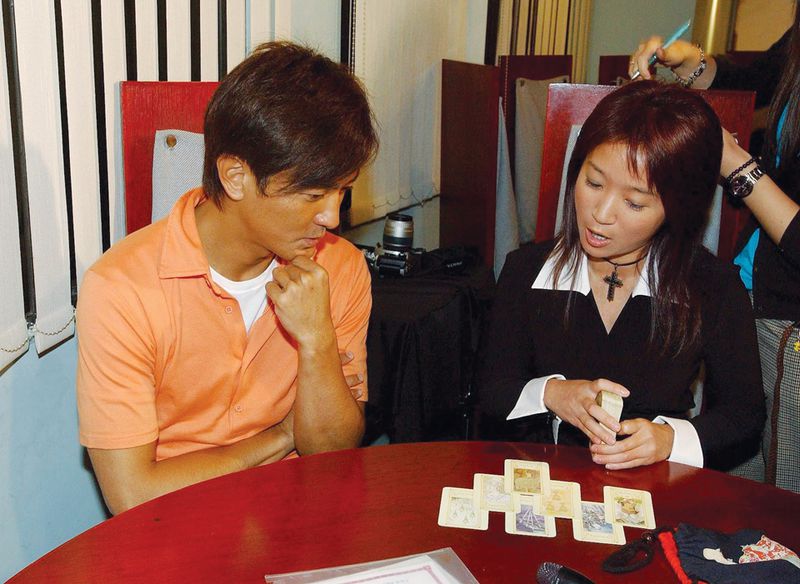
Tarot reading has become more prevalent in China over the last decade
Anqi compares her service to that of a psychological consultant, recalling the case of a 30-year-old customer who appeared to be suicidal. “I couldn’t use tarot cards to save him…I could only encourage him to tell me his true wishes,” she told Yitiao. “I talked to him for a long time and found out he studied drawing as a child, and encouraged him to pick it up again…four years later, he has never come back to me, but I see him post his sketches on WeChat.”
Less scrupulous millennial practitioners, though, do purport to solve life’s problems—for an exorbitant fee. According to police, most “seers” involved in the 2019 Chongqing bust were post-90s jobseekers who were recruited, under false pretenses, to work at “media companies,” and ran their internet-savvy scam over WeChat—advertising in chat groups, and offering palmistry and divination by instant message.
China’s state-run Xinhua News also recently castigated so-called “fortune telling apps,” on which users can upload images of their face and hands—and potentially put their biometric data at risk. On WeChat, Xinhua journalists identified public accounts for “AI fortune telling,” many using face recognition technology. Apps claiming to “help decode your fate” using “deep neural network technology” and “Eastern philosophy” charge customers a small fee to learn the results after entering their information (but still rely on sales and data harvesting for their main revenue).
This resurgence of interest in divination runs deeper—and often in more powerful circles—than just young smartphone users: 52 percent of county-level officials admitted believing in divination, “face reading,” and astrology in a 2007 survey by the Party-run Chinese Academy of Governance.
Xiao Wei (pseudonym), a 51-year-old middle-school teacher from Liaoning province, has visited a fortune teller almost every year since she was 20, despite being technically forbidden as a Party member.
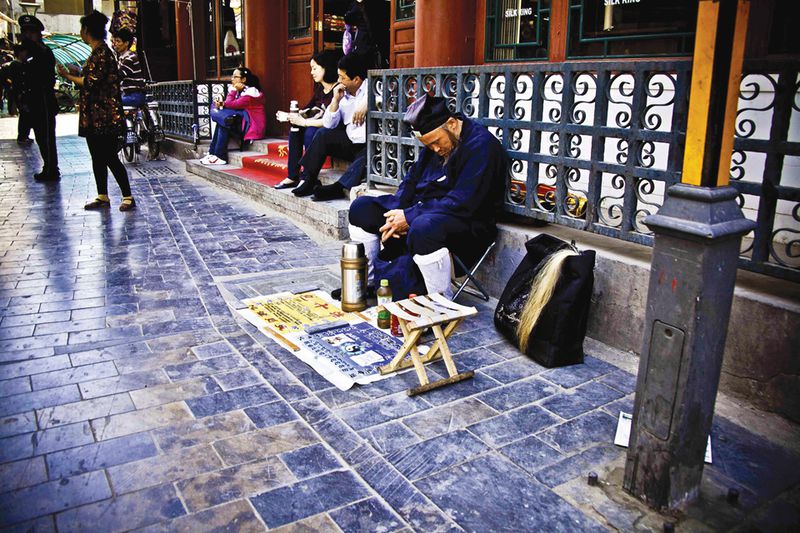
Authorities are divided about whether fortune telling is culture or superstition
Her first diviner, a “Mr. He,” told Xiao that her future husband wouldn’t be too tall, would have fair skin, and work in an office, and that she would live in a tall building. “Everything he said came true eventually,” Xiao alleges. Although Mr. He’s vision could easily apply to millions of middle-class Chinese, it was close enough to convince Xiao to return the year after to ask about the health of her parents, her career, and other matters.
Like Anqi’s tarot customers, the sense of psychological comfort drives Xiao to continue seeking their advice even when fortune tellers make frequent errors (“Some say ‘your parents are healthy,’ when they’re already dead,” Xiao says; “Some say I was destined to have a son, but I have a daughter”). “It gives me somewhere to place my hope,” Xiao explains to TWOC.
Back on Fortune Telling Street, though, the diviner visited by TWOC seemed more concerned with our spending than his own services as a seer. After asking for our friend’s birth date, and consulting an almanac, he observed, “You are a thrifty person, and never spend money recklessly” (perhaps a reference to our earlier haggling with his lüdagunr business partner). “You won’t get married very early,” he eventually concluded. “You need to be more tolerant in your relationships.” (Our friend is already married).
After failing to extract from us a further fee for a “lucky lottery,” the fortune teller added, “Sometimes, you are a little stingy.” Perhaps so, but he was equally unforthcoming with answers. “Are you journalists? Stop interviewing me!” he eventually snapped. “Even if you are, I am not scared!”
In her essay about Shanghai street life, “Day and Night in China,” the writer Eileen Chang observes how a Daoist diviner “kneels down before the door of a hardware store. Of course no one has money to give him, and he seems to take no notice of anyone anyhow, banging his head one time on the ground and giving up. He rises, the banging resumes, and he makes his way next door.” Even in the 1930s, these figures from Chinese tradition were treated as antiques without value, obstacles to modernity with a “past worth not a penny.”
Modern fortune tellers can appear no less ornamental in today’s landscape of vanishing architecture, suppressed memory, and lost history—but many learned to adapt to the times, staying on just the right side of legal fuzziness and cultural nostalgia. Before unceremoniously booting TWOC from his shop, the Fortune Telling Street diviner consented to answer our friend’s question about how many children she will have.
“Two; first a girl and then a boy,” he replied confidently. “Well, actually, it doesn’t matter what I say. You can’t have more than two under Chinese law anyway.”
– Additional reporting by Sun Jiahui (孙佳慧) and Hatty Liu
Seeking Fortune is a story from our issue, “Grape Expectations.” To read the entire issue, become a subscriber and receive the full magazine.





